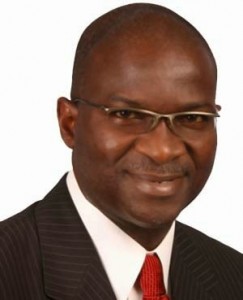 That Nigeria is effectively a two-party state was confirmed by the recent defections of Ondo state governor, Olusegun Mimiko and former Anambra state governor, Peter Obi from the Labour Party (LP) and the All Progressives Ground Alliance (APGA) to the Peoples Democratic Party (PDP). It had been clear for some time that both politicians were PDP in all but name.
That Nigeria is effectively a two-party state was confirmed by the recent defections of Ondo state governor, Olusegun Mimiko and former Anambra state governor, Peter Obi from the Labour Party (LP) and the All Progressives Ground Alliance (APGA) to the Peoples Democratic Party (PDP). It had been clear for some time that both politicians were PDP in all but name.
One of the likely fallouts of Obi’s defection may be that Anambra state governor, Willie Obiano and other hangers-on would also join the PDP. Similarly, if Peter Fayose is sworn in as Ekiti state governor, it is not unexpected that given the imperious powers of state governors, several politicians in the state will defect to the PDP – even if only for their political survival.
With James Ngilari taking over in Adamawa state, the PDP has effectively ensured that one of its own would be in charge of the state heading towards next year’s general elections. The development also reinforces the two-party state structure.
I do not often agree with the policies of former military president Ibrahim Babangida, but the development means that nearly 25 years after his imposition of two parties – and a tortuous socio-political odyssey – we have found ourselves back where we were in 1990. Perhaps, there’s a truth to the axiom of experience being the best teacher.
Nigeria is once again set for another big election battle. The major contenders that have publicly indicated their intentions to challenge President Goodluck Jonathan are former head of state, Muhammadu Buhari, former vice president, Atiku Abubakar, Kano state governor Rabiu Musa Kwankwaso, Edo state governor, Comrade Adams Oshiomole and Imo state governor, Rochas Okorocha.
To different degrees, any of these people would certainly provide the kind of focused and hands-on leadership Nigeria urgently requires, and halt the drift towards state collapse induced by unmitigated and officially sanctioned theft of public resources.
But why is the electorate not galvanized? Are Nigerians resigned to another four years of ‘achievements’ which only those in government can see, and which only the ‘transformation ambassadors’ can feel?
No one should underestimate what the ruling party and its apparatchiks would do to remain in power. The federal government has the powers to either induce or coerce virtually anyone it wants to either support it, or at least not to impede its march towards another electoral ‘victory’.
To stand any chance of winning the presidency, the APC must present candidates that transcend the ethnic and religious toga the PDP has been trying to box it into. And that means fielding someone like Lagos state governor Babatunde Raji Fashola as its presidential candidate, or at least, having him on the ticket.
In anywhere but Nigeria, Fashola would be the darling of the opposition and one of its best electoral assets, given his style of leadership and what he has achieved in Lagos state. Sadly, not only is he not being put forward, he seems resigned to leaving the political stage altogether – except if the APC wins the presidential elections. But can it win without someone like Fashola on the ticket?
Adamawa, Ekiti and the Judiciary
Ordinarily, the sacking of the inordinately ambitious Speaker of the Adamawa state House of Assembly Ahmadu Fintiri and swearing in of former Deputy Governor James Ngilari should a good omen and improve the badly battered image of the judiciary. Sadly, this is not the case.
I am not convinced that the judiciary has suddenly discovered the fear of God in the dispensation of justice, especially one related to power and politics. I may be wrong, but my suspicion is that the PDP might have read the signs on the wall; that it would lose Adamawa to the opposition APC if last Saturday’s governorship election had gone ahead.
Rather than allow that to happen, the PDP decided on option B, which was to rehabilitate Ngilari and position him to deliver Adamawa state to the party. Already, Ngilari’s words and actions prove that he is acting out a script carefully written and directed by Abuja.
Anyone who doubts this theory should reflect on what happened in Rivers state where the police broke the locks to the judiciary complex and escorted Abuja’s favoured Justice Daisy Okocha in her bid to assume office as the Chief Judge of Rivers state. A similar play is going on in Ado-Ekiti, where the state police commissioner and military officers have sealed court premises to stop judges from sitting on a case the PDP would rather have buried.
In these days of multimillionaire and billionaire judges, it is the more you see, the less you understand. Despite the efforts of the Chief Justice of the Federation, Maryam Aloma Mukhtar, to clean up the system, Nigeria’s legal structures are far more compromised and open to political interference than most people realize.